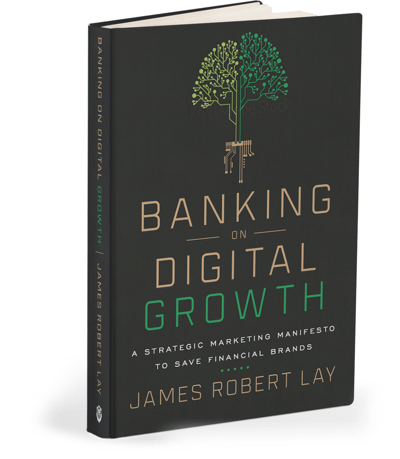“The easier a behavior is to do, the more likely you are to repeat it, and then it'll become a habit. So it's really about starting small. Small is sustainable. Small is repeatable.” -Audrey Cannata
The smallest things can make the biggest difference. A compliment from a bank teller puts a smile on your face. An email reminder prevents you from missing an important deadline. A phone call from a colleague inspires you to start a small business.
What little things are you doing to spread goodwill and benefit your brand? This topic arises from one of our favorite books, Tiny Habits: The Small Changes That Change Everything by B.J. Fogg.
Making Deposits into the Trust Fund
Everyone in the world has a trust fund that exists inside their mind. When you interact with a person or company, there’s a deposit to - or withdrawal from - the trust fund.
Great service? That’s a big deposit into the trust fund. Likewise, a bad experience takes a big chunk out of the trust fund. It’s not something we necessarily do consciously, but it’s exactly what’s happening when we think, “I just don’t trust that person/company.”
We recently heard a story he heard about a dentist in the New Jersey area who has a habit of making welcome phone calls to new patients on Saturdays.
The dentist found that in follow-up surveys, 80% of new patients refer to the Saturday phone calls in a positive way. They appreciated receiving a call from their new dentist checking in on them. Next time they’re in the dentist’s chair, they’ll feel more relaxed and comfortable.
This is the perfect example of a small habit that’s having a big effect on someone’s business. It’s a personal touch that builds trust and starts the customer’s voyage on a note of positivity.
Acknowledging the Impact of Stress and Time
If you work in the financial world, you might be reading the dentist’s story and thinking, “That’s great for a dentist, but it doesn’t work for a bank.” There’s often a perception that the financial industry should keep it professional and avoid getting too personal with its customers.
But what’s more personal than your money?
Up to 88% of Americans feel financially stressed at any given moment. This stress takes a toll on their health and their relationships. They need help managing their financial woes.
The book “Tiny Habits” explains that to make an impact on big issues like financial stress, you have to start small. The easier a behavior is to accomplish, the more likely you are to repeat it. Repetition builds a habit, and suddenly you have a new accomplishment that’s sustainable over the long term.
James Robert shared an example from his own life. He decided to stop drinking Starbucks and start supporting a local coffee shop. For a very long period, he patronized the local shop instead of Starbucks, but eventually, his Starbucks habit crept back in.
How did Starbucks get him back?
They provided a better experience in numerous small ways. They saved him time and made his day easier. Their app allows pre-orders, so you don’t have to wait in line. They also offer small discounts that add up to free drinks. Little by little, Starbucks rebuilt James’ habit of buying from them.
The Anatomy of a Tiny Habit
Tiny habits are composed of three main elements.
- The anchor moment
- The small behavior
- The instant celebration
The anchor moment is a tiny reminder to act or behave a certain way. It’s the box that pops up on your phone with a reminder message.
The small behavior is shrunk down version of the larger habit you are trying to accomplish. If you are trying to build a habit of reading, the small behavior might be to read one chapter, or even one page.
The instant celebration is the final stage. It’s the moment of inspiration or pride that comes from accomplishing something. It’s what fills your soul and encourages you to come back for more, over and over again.
In the context of financial services, the instant celebration is often neglected and missing from the experience. Someone reaches a financial milestone, like making a payment or paying off a loan, and…crickets.
There’s no celebration.
Financial brands have constant opportunities to create instant celebrations and help people feel accomplished about what they’re doing with their money. Give them that little dopamine hit that says, “Yes! I did it!”
News Flash: Aspiration Isn’t Action
Habit formation is deeply rooted in behavior. Aspiring to reach a goal isn’t the same thing as actually taking action to accomplish it.
Forming new habits requires both goal-setting and taking bold steps forward.
There’s nothing wrong with setting a big goal, but it’s meaningless unless you build the habit of making appreciable progress toward the goal.
You can’t suddenly achieve weight loss, get better sleep, or save more money.
Each of these goals takes the choice and action of a daily habit.
Think small and avoid becoming overwhelmed. Tiny habits should be easy to do and should only take a few seconds. If you’re trying to get better sleep, build the habit of putting your phone on “do not disturb” every time you slide into bed. Your daily habit leads to better sleep.
When it comes to money, saving $500 is challenging for most people. In fact, about 60% of Americans would have trouble absorbing a financial hit of just $500 for something unexpected like a car repair.
However, it’s easy to picture saving $5 per day. If you built this habit for 100 days, you’d have $500 in savings. This is the type of small thinking financial brands can use to connect with their customers and help them reach their goals.
Beating the Motivation Monkey
Motivation is what gets us through the quick sprints in life. It’s a wonderful thing, but high levels of motivation usually aren’t sustainable over the long term.
Don’t feel guilty about failing to sustain your motivation. It’s not your fault, and you’re not doing anything wrong. It’s just part of human psychology.
Think of it as the “motivation monkey.” The motivation monkey feels a big burst of energy at first, but then the monkey slows down. The good news is that the motivation monkey is also a creature of habit who can be reinvigorated by engaging in easy daily tasks.
Motivation is also like a muscle. It tires over time and needs daily exercise to become bigger. With practice, motivation builds capability, then capability builds your level of confidence.
Find other ways to “hack the behavior" that don't require large amounts of motivation.
Create or remove prompts in your life that remind you to do things or encourage you to make progress toward your goals. If you want to lose weight, remove certain food prompts from your refrigerator.
James Robert deleted most social media and apps from his phone because he discovered he was feeling so stressed, annoyed, and distracted that he was actually accomplishing less overall.
Over time, these changes will permeate your life, and your new habits become second nature. The shift involves complex topics like brain plasticity and reprogramming our behaviors, but what it boils down to is accomplishing transformation.
Why Is Transformation So Hard?
Transformation is challenging. It’s painful. It’s time-consuming.
Take the sting off transformation by asking questions. Spend some quiet time thinking through crucial questions that illuminate what could be done differently.
- Do you have time for a new behavior?
- Do you have enough money to make it happen?
- Are you physically capable of it?
- Does it require a lot of energy?
- What would make it easier?
- If it’s a lack of time, what would allow more time?
- If it’s a lack of money, how could you find more money?
- If it’s a lack of capability or energy, how could you free up resources?
- Could a change in routine make it possible?
- What small habits could you change to make a big impact?
For financial executives, it should be easy to think of time as an investment. The Digital Growth Institute uses a 90-day growth methodology where teams meet every 90 days to dedicate an entire day to refining strategies and goal-setting.
It’s an investment in your future. When you spend a whole day away from your phone, emails, apps, and the constant barrage of other distractions, you can truly focus on making things happen. There’s no better investment you can make.
This article was originally published on September 13, 2022. All content © 2024 by Digital Growth Institute and may not be reproduced by any means without permission.


